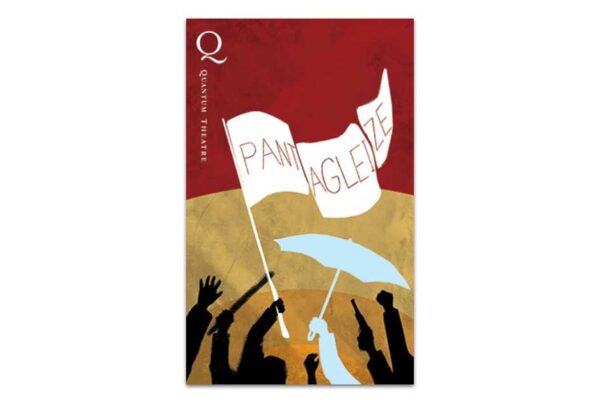 Seeing Mnemonic was one experience along a path of many which helped to shift and clarify my understanding of what theatre can do and how it can be done. Simon McBurney went to the École Jacques Lecoq as did I, and the first work of his I saw was his final “Commande” a short original piece all two-year graduates were required to create based on a given phrase from Lecoq. In his piece Simon played a timid man going to a doctor’s office to hear the results of his tests; a simple scenario filled with fear and anticipation, and acceptance in the face of the uncontrollable. We saw by turn the man’s outward bearing (the goose would not hear the word “boo” today) and his inner world. He revealed, using movement, the turbulence of the soul shattering emotions that are usually constrained, that we do not expose others to. Lecoq believed that we must use whatever vocabulary necessary to communicate but that it must come from acute observations and explorations of the the physical world. We cannot make an audience think or feel by feeling or thinking but only through making these thoughts and feelings manifest though the movement of the body and objects, through the waves of light and sound. What was clear inMnemonic was that narrative was only one manifestation of the journey, the train on the rails. What was just as important- if not more so if the work was to be revelatory rather than documentary- was what we see out of the window, what we half see, what we see as we doze off, what we feel as an carelessly placed word from a fellow traveler whisks us back to another place and time and we must relive the already lived. The Lecoq training and exposure to works by Theatre de Complicité confirmed for me that holding up a mirror to reality was not enough for a theatre artist.
Seeing Mnemonic was one experience along a path of many which helped to shift and clarify my understanding of what theatre can do and how it can be done. Simon McBurney went to the École Jacques Lecoq as did I, and the first work of his I saw was his final “Commande” a short original piece all two-year graduates were required to create based on a given phrase from Lecoq. In his piece Simon played a timid man going to a doctor’s office to hear the results of his tests; a simple scenario filled with fear and anticipation, and acceptance in the face of the uncontrollable. We saw by turn the man’s outward bearing (the goose would not hear the word “boo” today) and his inner world. He revealed, using movement, the turbulence of the soul shattering emotions that are usually constrained, that we do not expose others to. Lecoq believed that we must use whatever vocabulary necessary to communicate but that it must come from acute observations and explorations of the the physical world. We cannot make an audience think or feel by feeling or thinking but only through making these thoughts and feelings manifest though the movement of the body and objects, through the waves of light and sound. What was clear inMnemonic was that narrative was only one manifestation of the journey, the train on the rails. What was just as important- if not more so if the work was to be revelatory rather than documentary- was what we see out of the window, what we half see, what we see as we doze off, what we feel as an carelessly placed word from a fellow traveler whisks us back to another place and time and we must relive the already lived. The Lecoq training and exposure to works by Theatre de Complicité confirmed for me that holding up a mirror to reality was not enough for a theatre artist.
Realism falls short of reality. It shrinks it, attenuates it, falsifies it; it does not take into account our basic truths and our fundamental obsessions: love, death, astonishment. It presents man in a reduced and estranged perspective. Truth is in our dreams, in the imagination. – Ionesco




